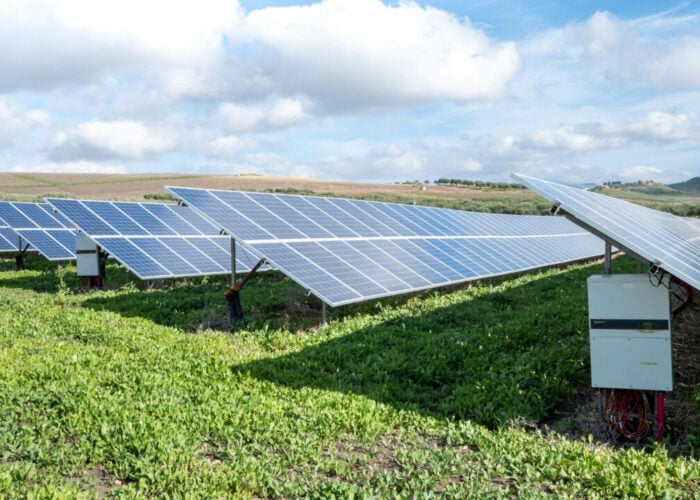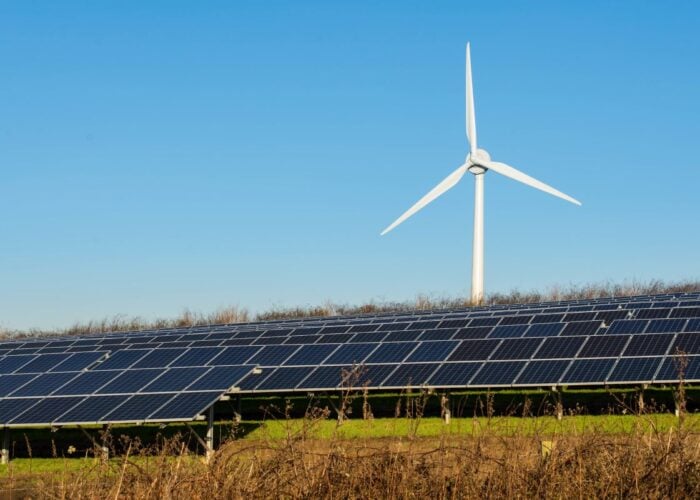The Czech government announced recently that it was about to take special measures against the ongoing solar boom in the country. These measures are to limit the rapid construction of solar power plants, which would otherwise lead to a dramatic increase in the price of electricity in the future. One of these measures maybe a brand-new tax imposed on producers of solar power.
Hottest political issue
Unlock unlimited access for 12 whole months of distinctive global analysis
Photovoltaics International is now included.
- Regular insight and analysis of the industry’s biggest developments
- In-depth interviews with the industry’s leading figures
- Unlimited digital access to the PV Tech Power journal catalogue
- Unlimited digital access to the Photovoltaics International journal catalogue
- Access to more than 1,000 technical papers
- Discounts on Solar Media’s portfolio of events, in-person and virtual
The political battle over the consequences of the solar boom in the Czech Republic has lately become a top political and public issue in the country. In order to constrain the future development of PV, the Czech government approved the National Allocation Plan, which calls for a substantial cap of 4.5MW a year for solar power in the period from 2012-2020.
The Czech Premier Petr Necas has publically announced that the government has been working very hard on a special package of measures to mitigate the danger of a “significant” increase in electricity prices for consumers in 2011. The government plans to discuss its strategy with representatives of the Czech Photovoltaic Industry Association (CZEPHO) in the course of next week. After that, the government measures will be officially presented.
Bizzare Estimates
During the last two months, the biggest electricity utility in the country, CEZ a.s., has presented several forecasts of the dramatic price increase of electricity due to the continuing boom of renewable power in the Czech Republic. However, these estimates vary considerably and show the possibility of a 20% increase in the price of electricity in 2011 for end-consumers.
However, according to PV experts, the estimates from CEZ are “deliberately” overestimated and are based on strange figures related to the size of new PV installations, which would be connected to the grid by the end of 2010.
Jan Ondrich, an analyst at Condole Partners, says that the estimates of CEZ are indeed bizarre and serve as “ammunition” for politicians to act accordingly in order to regulate the support scheme for PV.
Frantisek Smolka, member of the board of CZEHPO, also refuted the fact that the price of electricity would increase by as much as 20% as a consequence of the solar boom. Smolka said, “According to our estimate, the price of electricity will be increased in the range of 7-8%.”
At the moment it is almost impossible to assess the impact of the current FiT on the future prices of electricity. According to data from the Czech Energy Regulation Office (ERU), the total installed capacity of PV in the Czech Republic was 622MW at the end of July 2010. This equates to 160MW of newly built and connected PV installations during January–July 2010 (see the chart below).
At the beginning of 2010, the experts of CEZ were warning the public and politicians of possible “blackouts” related to several thousand of new megawatts of PV installations in 2010. These estimates were based only on filed applications for planned new PV installations.
However, several PV experts expect that by the end of 2010, there would be between 800 and 1200MW of new installed PV capacity in the Czech Republic.
The secret new market leader
Czech politicians have stated for the first time to the public that a ‘possible’ cause of the current solar boom is actually the state-owned utility CEZ. It is indeed surprising that on the one hand, Czech politicians–some of whom are members of the board of CEZ–officially criticized ground-mounted PV installations, and on the other hand have let the state-owned company build over 200MW of extremely large solar parks in the country.
CEZ is indeed the biggest player in the Czech Republic and it is strongly focusing on the construction of solar parks, primarily in the 20-60MW range. However, CEZ does not disclose any detailed information on its solar projects.
Jaroslav Mil, president of the Confederation of industry of the Czech Republic, pointed out on Czech television last week that CEZ was responsible for the ongoing solar boom and asked government representatives to intervene in order to limit or even stop the construction of these large solar parks.
Imminent actions
As there are elections for the Czech Senate in mid-October I expect that the Czech politicians will take swift action against the present solar boom. There are several options that could be implemented to tame the current boom.
Firstly, the government declared it would immediately start negotiations with solar park investors on a voluntary decrease of the FiT. However, this route is unlikely to lead to any consensus since this changes the original terms and conditions established within the FiT and already past into law.
Czech-based banks also disagree with the government proposal as they are heavily exposed to funding PV installations in the Czech Republic. Banks would prefer to keep the current FiT prices. According to Jaromir Rehak, president of CZEPHO, the state should solve this issue with CEZ, which has the majority stake in PV installations.
New special “eco” tax
Another option is to impose a brand-new ecological tax on solar power or on the land where PV installations are situated. It is a very controversial issue and may lead to legal disputes and arbitrages against the Czech Republic.
According to Jan Hajek and Lukas Nyvlt, legal advisors of leading Czech legal office Glatzova and Co., the implementation of new taxes on solar power would stand for a substantial change of the conditions related to doing business in the country. “In this respect we expect a new boom of legal disputes between foreign investors and the Czech state,” noted the legal advisors.
The Czech government has the capability to create bureaucratic barriers for PV plants. It could include measures such as extending approval procedures, refusing to sign connection agreements, and creating new other administrative hurdles.
Another step the government is preparing against PV is a very rigorous inspection of technical features of the newly built PV plants. The PV plants have to adhere to defined technical standards. If these are not met, then Energy Regulation Office may not grant FIT for such power plants. These rigorous inspections will be applied only to PV plants with total installed capacity over 500 kWp.
Last week the Czech Ministry of Finance officially confirmed that beginning in 2011, a new law will be applied that will result in the termination of a tax exemption based on which all present PV installations are freed from payment of income tax for a period up to six years. This means a new financial burden for the operators of PV plants in the Czech Republic.
We have already noticed several complaints, primarily from small PV investors whose PV plants were built based on previously issued grid-connection permits but operators of distribution grids have since refused to interconnect them. These cases were officially confirmed by the ERU. Hajek and Nyvlt of Glatzova and Co. commented: “We have so far been filing dozens of cases like that occurred to our clients.”
Turning EU Legislation into Caps
Simultaneously, the Czech government has been intensively working on a new legislation which will considerably constrain the future development of solar and wind power. The first action was the government approval of the National Allocation Plan (NAP), which calls for a substantial cap of 4.5MW a year for solar power from 2012-2020.
In order to comply with respective EU regulation supporting the development and minimum goals for renewable energy, the Czech government prepared NAP in such a way that is sets very stringent caps (at a level unparalleled in the EU) on the future development of the PV sector. Moreover, NAP is to become a part of the new law on supported sources of energy, which will be soon passed by the Parliament.
In compliance with the approved NAP, there will no further support by means of FIT for solar power if the respective caps are breached in any single year from 2012-2020. On the top of that, the legal advisors of Glatzova and Co. are of the opinion that NAP is in a conflict with several EU regulations. The detailed legal analysis of NAP in Czech can be found HERE.
New Controversial Legislation
The Ministry of Industry and Trade (MIT) has already prepared a brand new law regulating the development of PV in the Czech Republic. The proposed bill which is called “Law on Supported Sources of Energy” (LSSE) contains several measures aiming at constraining the future development of PV in the Czech Republic, such as:
– Maximum price cap of 6 CZK/kWh.
– Future FIT will be paid only to PV plants with maximum installed power of 100kW.
– A new price mechanism established for solar plants with capacity over 100kW based on so called “hourly green bonuses” tied to price of electricity at the Prague Power Exchange.
– Solar investors will be responsible for recycling of solar modules via a mandatory fee.
– A ban on construction of solar plants on all arable farm land or extremely high fees charge to the authorities for using this land in order to discourage investors from building ground-mounted SSP.
In the next several weeks the Czech Parliament will take its decision on LSSE, which will determine the future development of the PV sector in the Czech Republic.
Czech PV needs Reform not Destruction
Undoubtedly, the Czech solar industry has to be reformed. A current system of the state support is too generous and the present solar boom is not sustianable. “The goal of the PV legislative changes however should be reform, not the destruction of the PV industry. The Czech PV needs the creation of a stable business environment enabling a sustainable development of the industry in the Czech Republic in the long run,” adds Glatzova and Co.'s Hajek.
According to Zuzana Musilova, secretary of CZEPHO, the solar energy should be primarily generated on rooftops, not on arable land.
Apparently, local politicians will soon take steps to curb the current ‘unhealthy’ pace of the solar boom. However, some of the proposed measures look like a punishment for PV which seem to jeopardize the monopoly of CEZ in the generation of power in the Czech Republic.







